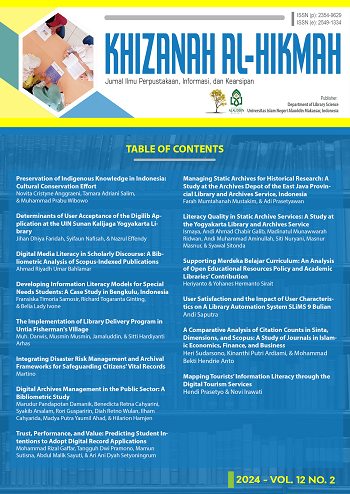Managing Static Archives for Historical Research: A Study at the Archives Depot of the East Java Provincial Library and Archives Service, Indonesia
Abstract
This study investigated the procedures for managing static archives as historical research sources and the challenges encountered in the management process at the the Archives Depot of the East Java Provincial Library and Archives Service, Indonesia. Data were collected through observations, semi-structured interviews, and documentation. The study applied static archive management theories, encompassing record selection, accessioning, arrangement, description, conservation, preservation, storage, and reference functions. The findings revealed that static archive management involves interconnected processes, including selecting records, accessioning, arranging, describing, preserving, and utilizing archives for historical research. Despite the structured procedures, internal challenges such as limited archivist competence, insufficient technical and operational support, and inadequate budgets, facilities, and infrastructure hinder optimal management. External challenges stem from the low public awareness of the importance of preserving static archives. It underscores the universal importance of effective static archive management in preserving historical records for future generations. It highlights common challenges faced by archival institutions, particularly in resource-constrained environments, and offers insights that can inform best practices globally.
Downloads
References
Agusti, F. R., & Wasisto, J. (2019). Preservasi Manuskrip di UPT Museum Sonobudoyo sebagai Usaha Menjaga Eksistensi Budaya di Yogyakarta. Jurnal Ilmu Perpustakaan, 6(4), 251–260. https://doi.org/10.2/JQUERY.MIN.JS
Azmi. (2016). Deskripsi dan Penataan Arsip Statis. Universitas Terbuka.
Colavizza, G., Blanke, T., Jeurgens, C., & Noordegraaf, J. (2022). Archives and AI: An Overview of Current Debates and Future Perspectives. Journal on Computing and Cultural Heritage, 15(1). https://doi.org/10.1145/3479010/ASSET/454FA412-DE17-47A5-B4B0-EE5ACB3E6ED0/ASSETS/GRAPHIC/JOCCH1501-04-F01.JPG
Disperpusip. (2017). Beranda. https://disperpusip.jatimprov.go.id/
Fadhli, M. (2021). Manajemen Arsip Statis sebagai Upaya Pelestarian Informasi Lembaga Pemerintahan di Badan Perpustakaan dan Arsip Daerah Provinsi Jambi. Shaut Al-Maktabah : Jurnal Perpustakaan, Arsip Dan Dokumentasi, 13(2), 194–203. https://doi.org/10.37108/SHAUT.V13I2.495
Friedewald, M., Székely, I., & Karaboga, M. (2024). Access to Public Archives in Europe: progress in the implementation of CoE Recommendation R (2000)13 on a European policy on access to archives. Archives and Records, 45(1), 55–71. https://doi.org/10.1080/23257962.2023.2285954
Guccio, C., Martorana, M., Mazza, I., Pignataro, G., & Rizzo, I. (2020). An assessment of the performance of Italian public historical archives: Preservation vs utilisation. Journal of Policy Modeling, 42(6), 1270–1286. https://doi.org/10.1016/J.JPOLMOD.2019.12.006
Kepala Arsip Nasional Republik Indonesia. (2016). Peraturan Kepala Arsip Nasional Republik Indonesia Nomor 26 Tahun 2016 tentang Pedoman Keterbukaan Arsip Statis untuk Penelitian dan Pengembangan Ilmu Pengetahuan serta Penyelidikan dan Penyidikan. Pusat Pendidikan dan Pelatihan Kearsipan ANRI.
Martínez-Cardama, S., & Pacios, A. R. (2022). National archives’ priorities: an international overview. Archival Science, 22(1), 1–42. https://doi.org/10.1007/S10502-021-09367-Y/TABLES/4
Miles, M. B., Huberman, A. M., & Saldana, J. (2014). Qualitative Data Analysis: A Methods Sourcebook. SAGE Publications.
Miller, F. M. (1990). Arranging and Describing Archives and Manuscripts. Society of American Archivists.
Muhidin, S. A., & Winata, H. (2018). Manajemen Kearsipan. Pustaka Setia.
Prasetyawan, A. (2022). Preservation of Family Archives in The Era of Information Technology. ISCE : Journal of Innovative Studies on Character and Education, 6(1), 63–70. https://www.iscjournal.com/index.php/isce/article/view/135
Pratama, R. (2020). Archiving Historical Data : Three Criticisms for the Reliability of Digital Sources. Khizanah Al-Hikmah : Jurnal Ilmu Perpustakaan, Informasi, Dan Kearsipan, 8(2), 242–250. https://doi.org/10.24252/KAH.V8CF2
Putri, A. E. (2019). Praktik Akuisisi Arsip Statis dan Problematiknya Studi Kasus di Universitas Negeri Yogyakarta. Khazanah: Jurnal Pengembangan Kearsipan, 12(1), 36. https://doi.org/10.22146/KHAZANAH.47255
Rakhmawati, R., Bramantya, A. R., & Susanti, T. (2020). Arsip Foto bagi Generasi Muda Melalui Aplikasi Arto. Khizanah Al-Hikmah : Jurnal Ilmu Perpustakaan, Informasi, Dan Kearsipan, 8(1), 30–41. https://doi.org/10.24252/KAH.V8I1A4
Rakhmawati, R., Nuryadani, F. W., Nabila, W., & Arista, Y. (2018). “Arsip Statis Tanggung Jawab Siapa?” Kajian Perbandingan Konsep dan Pelaksanaan Akuisisi Arsip antara Sektor Publik dengan Sektor Swasta. Khizanah Al-Hikmah : Jurnal Ilmu Perpustakaan, Informasi, Dan Kearsipan, 6(2), 141–154. https://doi.org/10.24252/KAH.V6I2A6
Sekretariat Nasional SDGs. (2023). Agenda 2030 untuk Pembangunan Berkelanjutan. Sekretariat Nasional SDGs. https://sdgs.bappenas.go.id/
Setyawan, H. (2021). Digitisasi Arsip Dalam Rangka Layanan Arsip Statis dalam Jaringan pada Masa Pandemik Covid19. Khazanah: Jurnal Pengembangan Kearsipan, 14(2), 116–132. https://doi.org/10.22146/KHAZANAH.63408
Touray, R. (2021). A Review of Records Management in Organisations. Open Access Library Journal, 8(12), 1–23. https://doi.org/10.4236/OALIB.1108107
Widodo, B. P. (2022). Akuisisi Arsip. Universitas Terbuka.
Copyright (c) 2024 Farah Mumtahanah Mustakim, Adi Prasetyawan

This work is licensed under a Creative Commons Attribution-NonCommercial-ShareAlike 4.0 International License.
By submitting your manuscript to our journal, you are following Copyright and License

